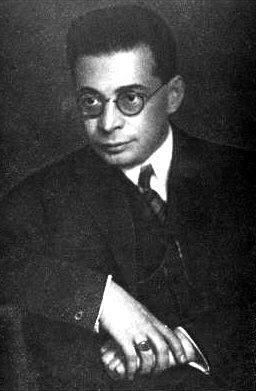Related Research Articles
Neurosis is a term mainly used today by followers of Freudian thinking to describe mental disorders caused by past anxiety, often that has been repressed. This concept is more usually known today as psychological trauma.

Otto Rank was an Austrian psychoanalyst, writer, and philosopher. Born in Vienna, he was one of Sigmund Freud's closest colleagues for 20 years, a prolific writer on psychoanalytic themes, editor of the two leading analytic journals of the era, managing director of Freud's publishing house, and a creative theorist and therapist. In 1926, Rank left Vienna for Paris and, for the remainder of his life, led a successful career as a lecturer, writer, and therapist in France and the United States.
The genital stage in psychoanalysis is the term used by Sigmund Freud to describe the final stage of human psychosexual development. The individual develops a strong sexual interest in people outside of the family.
Anal eroticism, in psychoanalysis, is sensuous pleasure derived from anal sensations. Sigmund Freud, the founder of psychoanalysis, hypothesized that the anal stage of childhood psychosexual development was marked by the predominance of anal eroticism.
Heinz Hartmann, was a psychiatrist and psychoanalyst. He is considered one of the founders and principal representatives of ego psychology.

Repetition compulsion is the unconscious tendency of a person to repeat a traumatic event or its circumstances. This may take the form of symbolically or literally re-enacting the event, or putting oneself in situations where the event is likely to occur again. Repetition compulsion can also take the form of dreams in which memories and feelings of what happened are repeated, and in cases of psychosis, may even be hallucinated.

Franz Gabriel Alexander was a Hungarian-American psychoanalyst and physician, who is considered one of the founders of psychosomatic medicine and psychoanalytic criminology.
In the psychology of defense mechanisms and self-control, acting out is the performance of an action considered bad or anti-social. In general usage, the action performed is destructive to self or to others. The term is used in this way in sexual addiction treatment, psychotherapy, criminology and parenting. In contrast, the opposite attitude or behaviour of bearing and managing the impulse to perform one's impulse is called acting in.
"Medusa's Head", by Sigmund Freud, is a very short, posthumously published essay on the subject of the Medusa Myth.
Don Juanism or Don Juan syndrome is a non-clinical term for the desire, in a man, to have sex with many different female partners. The name derives from the Don Juan of opera and fiction. The term satyriasis is sometimes used as a synonym for Don Juanism. The term has also been referred to as the male equivalent of nymphomania in women. These terms no longer apply with any accuracy as psychological or legal categories of psychological disorder.
Otto Fenichel was a psychoanalyst of the so-called "second generation".
Paul Ferdinand Schilder was an Austrian psychiatrist, psychoanalyst, and medical researcher.
Identification is a psychological process whereby the individual assimilates an aspect, property, or attribute of the other and is transformed wholly or partially by the model that other provides. It is by means of a series of identifications that the personality is constituted and specified. The roots of the concept can be found in Freud's writings. The three most prominent concepts of identification as described by Freud are: primary identification, narcissistic (secondary) identification and partial (secondary) identification.
Alloplastic adaptation is a form of adaptation where the subject attempts to change the environment when faced with a difficult situation. Criminality, mental illness, and activism can all be classified as categories of alloplastic adaptation.
Sandor Rado was a Hungarian psychoanalyst of the second generation, who moved to the United States of America in the 1930s.

Hanns Sachs was one of the earliest psychoanalysts, and a close personal friend of Sigmund Freud. He became a member of Freud's Secret Committee of six in 1912, Freud describing him as one "in whom my confidence is unlimited in spite of the shortness of our acquaintance".

Ernst Simmel was a German-American neurologist and psychoanalyst.
Some Character-Types Met within Psycho-Analytic Work is an essay by Sigmund Freud from 1916, comprising three character studies—of what he called 'The Exceptions', 'Those Wrecked by Success' and 'Criminals from a Sense of Guilt'.
Kate Friedlander was a pioneering female psychoanalyst, who left Germany for England in 1933, and became a member of the British Psychoanalytical Society.
Little Arpad' [Bandi, 'Rooster Man'] is the name given to a case history of a child with a rooster identification and fetish by the psychoanalyst Sandor Ferenczi.
References
- ↑ Fenichel, Otto; Rangell, Leo (1996). The psychoanalytic theory of neurosis (50th anniversary ed.). New York: Norton. p. 217. ISBN 0393038904. OCLC 32927192.
- ↑ Peter Gay, Freud: A Life for Our Time (London 1989)p. 368 and p. 647
- ↑ Fenichel, Otto; Rangell, Leo (1996). The psychoanalytic theory of neurosis (50th anniversary ed.). New York: Norton. p. 229. ISBN 0393038904. OCLC 32927192.
- ↑ George Henderson et al, A Practitioner's Guide tp Understanding Indigenous and Foreign Cultures 92006) p. 57
- ↑ Steven Wainrib, "Autoplastic"